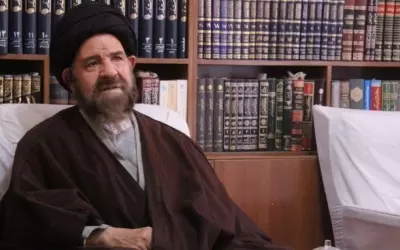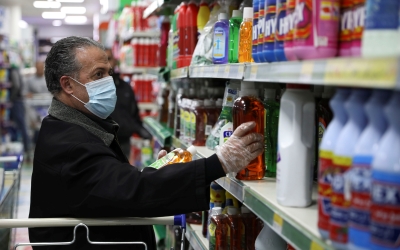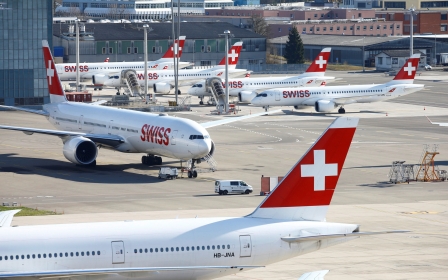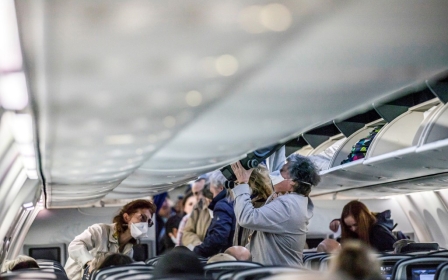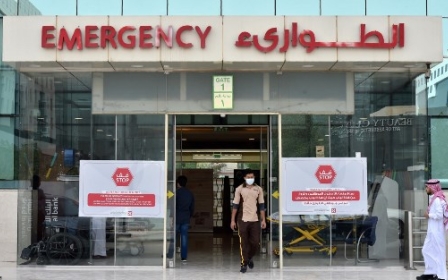Coronavirus: What restrictions have been implemented in the Middle East?

Countries across the Middle East and North Africa, like much of the world, have been issuing restrictions on travel, business and public gatherings as they fight to curb the spread of the novel coronavirus.
The outbreak of the disease - officially known as Covid-19 - originated in China in December, where it has reportedly infected 81,048 people and killed around 3,204, according to the latest numbers from the World Health Organisation (WHO).
Globally, there have been around 167,515 confirmed cases of the coronavirus and 6,606 confirmed deaths, according to WHO's most recent figures.
While both data sets increase daily, exact numbers vary as the world struggles to provide enough tests to those at risk of infection.
In the Middle East, Iran has been hit the worst by the outbreak, with between 12,000 and 15,000 confirmed cases and more than 600 dead.
US sanctions have severely exacerbated the situation in Iran, which has struggled to import basic goods and medical supplies.
WHO reported on 6 March that the mortality rate for Covid-19 is now at about three to four percent. For seasonal influenza, mortality is usually well below 0.1 per cent.
While most cases report only mild, flu-like symptoms, Covid-19 has a far wider and easier spread than similar viruses such as Sars or Mers.
Middle East Eye takes a look at the countries it has spread to, and their initiatives to curb the virus:
Case tallies and death tolls as reported by WHO on 16 March, official government tallies may differ
Algeria (49 cases, government reports four dead)
-
Suspended all air and sea links with France (starting 17 March)
-
Suspended economic, cultural and political gatherings
-
Postponed all international sports
-
Ordered a ban on mass street protests that have taken place in the country for more than a year
Bahrain (211 cases, government reports one dead)
-
Ordered non-compliance with isolation measures (implemented for those positive or at risk for Covid-19) to be punishable by up to three months in jail and a fine of up to 10,000 Bahraini dinars ($32,000)
-
Banned citizens from travelling to Iran
-
Released and granting pardon for hundreds of prisoners
Egypt (126 cases, two deaths)
-
Suspended all air traffic from 19 March until 31 March (tourists in country able to complete vacations)
-
Closed schools and universities
-
Cancelled tours of monuments, cultural events and balloon trips in the ancient city of Luxor
-
Reduced number of public sector employees coming to work
Gaza (No cases reported)
-
Closed all border crossings
Iran (14,991 cases, 853 dead)
-
Ordered a semi-lockdown, with security forces ordered to clear streets nationwide
-
Closed shops and businesses
-
Closed schools and universities
-
Borders remain open
-
Requested the International Monetary Fund for a $5bn loan to fight the disease
Iraq (124 cases, nine dead)
-
Closed the border to Iranian nationals and suspended flights to Iran
Israel (200 cases)
-
Requires all citizens returning from abroad to go into self-quarantine
Jordan (Six cases)
-
Banned passenger flights leaving the country (starting 17 March)
-
Banned all public gatherings
-
Urged citizens to stay at home
-
Closed borders with Egypt, Iraq, Israel, Syria and the occupied Palestinian territories
-
Closed schools and universities
-
Closed cinemas, sporting facilities and tourist sites
-
Banned public prayers at mosques and churches
-
Suspended visits to hospitals and prisons
-
Jordan's King Abdullah approved a law that gives the government the power to enforce a state of emergency
Kuwait (112 cases)
-
Largely locked down the country, the only nation other than Italy to do so
Lebanon (99 cases, three dead)
-
Ordered residents not to leave their homes except for urgent necessities
Libya (no cases reported)
-
No restrictions reported
Mauritania (One case)
-
No restrictions reported
Morocco (28 cases, one dead)
-
Suspended air, sea and land links with European countries, Algeria and China
-
Suspended all international commercial flights "until further notice"
-
Suspended all football matches and sporting events
-
Closed all schools and universities
-
Banned gatherings of more than 50 people
Occupied West Bank (38 cases)
-
Suspended prayers in mosques and churches
-
Banned entry to tourists visiting cities and sites, including Bethlehem's Church of the Nativity
-
Closed schools and universities
-
Urged citizens to stay at home
Oman (22 cases)
-
Oman Petroleum and Energy Show (OPES) postponed
-
Closed all shops except for food stores, pharmacies, optical stores and clinics
-
Shut down all tourist sites
-
Banned gatherings in public places including beaches and parks, and closed salons and barbershops, and cultural and sports clubs
-
Closed mosques, but the call to prayer will still be broadcast
Qatar (401 cases)
-
Schools and universities closed
-
Gyms and cinemas also closed
-
Many public events, including the MotoGP, have been cancelled
-
Entry barred for arriving air passengers, except citizens (starting 18 March)
-
Entry barred currently for travellers from Italy, France, Spain and Germany
-
Public transport in Doha suspended
-
Closed part of the country's industrial area for a period of 14 days
-
Closed all shops except for food stores and pharmacies
Saudi Arabia (103 cases)
-
Suspended all international flights (14 March - 28 March)
-
Suspended government work with exception of health, security and military sectors
-
Ordered all workers to stay at home for 16 days (starting 16 March)
-
Closed schools and universities
-
Closed all malls, restaurants, cafes and public parks
-
Supermarkets, pharmacies, and food delivery companies remain open
-
Closed off eastern province of Qatif, where most of the kingdom's coronavirus cases have come from
-
Suspended holy Muslim Umrah pilgrimage to Mecca and Medina
-
Suspended congregational and weekly Friday prayers except at the two holy mosques in Mecca and Medina
Sudan (One case, government reports one dead)
-
Banned public events
-
Banning travel from eight countries: South Korea; China; Japan; Italy; Iran; Spain; Egypt and France.
-
Closed all three border crossing points with Egypt
-
Limited the number of international flights
-
Limited sports events
-
Considering closures of schools and universities
Tunisia (24 cases)
-
Suspended all international flights and land borders (18 March - ?)
-
Restaurants, cafes, and bars ordered to close after 4pm local time
-
Five-hour workday for government employees
-
Supermarkets and pharmacies remain open
Turkey (47 cases)
-
Banned flights from six countries: the UK; UAE; Egypt; Ireland; Saudi Arabia and Switzerland (starting on 17 March)
-
Cancelled all congregational worship, including Friday prayers, but mosques and churches remain open to worshippers for individual prayer
-
Schools and colleges closed
-
Closed entertainment venues, such as bars; nightclubs; cinemas; cafes; Turkish baths; amusement parks and swimming pools
UAE (98 cases)
-
Banned all travel to Iran and Thailand
-
Closed amusement parks and museums in Abu Dhabi, the capital of the UAE
-
Closed movie theatres, arcades and gyms in Dubai
-
Cancelled final two stages of the UAE Tour, a bicycle tournament which featured some of the world's leading riders
-
Etihad Airways announced the suspension of flights to and from Rome and Milan
Yemen (no cases reported)
-
UN flights into Sanaa, where the UN-recognised government is based, have been suspended
-
The Houthi movement have closed schools in areas they control
Middle East Eye propose une couverture et une analyse indépendantes et incomparables du Moyen-Orient, de l’Afrique du Nord et d’autres régions du monde. Pour en savoir plus sur la reprise de ce contenu et les frais qui s’appliquent, veuillez remplir ce formulaire [en anglais]. Pour en savoir plus sur MEE, cliquez ici [en anglais].


